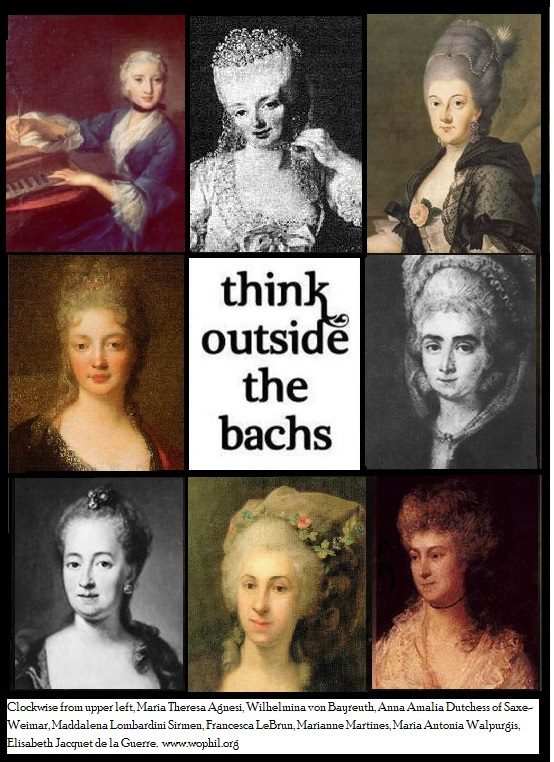The classical music world has been all a-tizzy in recent days about Martin Jarvis’ work linking Anna Magdalena Bach to J.S. Bach’s Cello Suites. The story first made headlines in 2008, and again last week now that the theory is explored in a film.
The responses to the very idea that Bach’s highly trained wife, who often copied Bach’s works and also helped direct the musical education of all of the Bach children, have been fascinating to observe. From trolling commenters on news articles to lengthly responses from academics, it seems that it is nearly impossible to entertain the notion that Anna Magdalena could have had anything to do with Bach’s creative output. And most of those rejectting the idea have neither read Jarvis’ scholarship nor seen the new film.
I find the theory plausible and the evidence compelling. It would be far from the first time that a woman’s work was attributed to her husband. There is a long, dark history of men taking ownership of the creative output of their wives — whether out of necessity, as women’s works would be dismissed outright, or out of malice. And it’s still happening, which made news even in the last few weeks with the story of painter Margaret Keane. Another perhaps less known, or less controversial, instance is that of Clara and Robert Schumann. Scholars have taken great interest in particular of the Oboe Romances, written at a particularly distressing time in Robert’s life and which were likely penned by Clara and published under Robert’s name to allow for income for the family.
One of the most significant voices in the conversation is that of Alex Ross, classical music critic for The New Yorker. His thoughts on the subject, which can be read online here, are largely in line with the other skeptics, finding the theory implausible at best. However, it was his final thoughts that struck me the most:
That said, no one is well served by wild speculation that distorts the historical record—or, for that matter, ascribes a piece of music to a woman on the grounds that it lacks maturity. And while classical music displays an excruciating gender imbalance—a recent study by Ricky O’Bannon found that 1.8 percent of works programmed by leading American orchestras in the 2014-15 season were by women—the most efficient way to address that imbalance would be to commit more resources to contemporary music. As Amy Beth Kirsten has said, “Perhaps if we are going to fixate on equality in programming it should be to balance out the division between living composers and dead ones.” A classical-music world dominated by the past will, inevitably, be one dominated by men. Instead of trying to invent a female Bach in prior centuries, let’s seek her in the present.
To which I must counter that we do not need to completely dismiss any hope of finding accomplished women composers in the past – we don’t need to “invent” a female Bach from history. We only need to pay attention to the historical record that exists to find many highly accomplished women, largely forgotten.
Consider just a handful of Bach’s contemporaries.
Elisabeth Jacquet de la Guerre (1665-1729) was a French born child prodigy harpsichordist and prolific composer.
Marianna Martines (1744-1812) was an Austrian composer, pianist, and singer. As a child she was the pupil of Joseph Haydn. Her works list include four masses as well as two oratorios, sacred and secular cantatas, and a symphony.
Maria Teresa Agnesi Pinottini (1720-1795) was and Italian composer, singer, and harpsichordist. Not much is known about her life or career, but several works are extant.
Maria Antonia Walpurgis (1724-1780), Duchess of Bavaria, studied extensively, no doubt permissible due in large part to he social standing. Her work consisted of operas which were highly regarded in their time.
There is no need to invent accomplished women composers of the past. We only have to pay careful attention to history and bring neglected works to light. While I am always in favor of encouraging and supporting new works by women, we also need to acknowledge the long history of women who composed against all odds.

